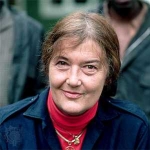Background
Amy Vedder was born on March 24, 1951, in Palatine Bridge, New York, United States.

500 College Ave, Swarthmore, PA 19081, United States
Vedder graduated from Swarthmore College in 1973.
Madison, WI, United States
Vedder earned her Master of Science in 1982 and Doctor of Philosophy in 1989 form the University of Wisconsin-Madison.
Photo of Amy Vedder
Photo of Amy Vedder
Photo of Amy Vedder
Photo of Amy Vedder
Photo of Amy Vedder
Photo of Amy Vedder
Photo of Amy Vedder













(When Bill Weber and Amy Vedder arrived in Rwanda to study...)
When Bill Weber and Amy Vedder arrived in Rwanda to study mountain gorillas with Dian Fossey, the gorilla population was teetering toward extinction. Poaching was rampant, but it was loss of habitat that most endangered the gorillas. Weber and Vedder realized that the gorillas were doomed unless something was done to save their forest home. Over Fossey's objections, they helped found the Mountain Gorilla Project, which would inform Rwandans about the gorillas and the importance of conservation, while at the same time establishing an ecotourism project - one of the first anywhere in a rainforest - to bring desperately needed revenue to Rwanda.
https://www.amazon.com/Kingdom-Gorillas-Quest-Rwandas-Mountain/dp/0743200071/ref=sr_1_2?dchild=1&keywords=Amy+Vedder&qid=1612793326&s=books&sr=1-2
2001
biologist ecologist primatologist author
Amy Vedder was born on March 24, 1951, in Palatine Bridge, New York, United States.
Vedder was educated at Canajoharie High School. She graduated from Swarthmore College in 1973. She earned her Master of Science in 1982 and Doctor of Philosophy in 1989 from the University of Wisconsin-Madison.
Vedder began her work in Africa as a member of the Peace Corps from 1973-1975, and following her graduate studies, began fieldwork for the Wildlife Conservation Society (WCS).
When Amy Vedder and Bill Weber arrived in Rwanda, East Africa to study mountain gorillas with Dian Fossey, the gorilla population was teetering toward extinction. Poaching was rampant, but it was the loss of habitat that most endangered the gorillas. Weber and Vedder realized that the gorillas were doomed unless something was done to save their forest home. Over Fossey's objections, they helped found the Mountain Gorilla Project in 1979, which would inform Rwandans about the gorillas and the importance of conservation, while at the same time establishing an ecotourism project - one of the first anywhere in a rainforest - to bring desperately needed revenue to Rwanda.
From 1990-1993, Vedder served as WCS's Biodiversity Program coordinator. In 1993, she was appointed director for WCS's Africa Program, overseeing all field projects, program designs, implementation of projects, synthesis, and assessment. The Africa Program is a major facet of WCS's International Conservation Program, which comprises more than 300 field projects in 52 countries.
She is the director and vice president of Wildlife Conservation Society's Living Landscapes Program, a new initiative geared towards balancing the needs of wildlife and people. As a director, she is overseeing the implementation of a science-based approach to conserving wildlife and wildlands outside of protected areas.
Amy Vedder is perhaps best known for the Mountain Gorilla Project, an innovative approach undertaken with her husband, Bill Weber, to conserving habitat in war-torn Rwanda for one of the world’s last remaining gorilla populations. She has over 30 years of experience in conservation efforts across the globe, has overseen more than 100 different conservation projects in locations ranging from New York State and Wyoming to Mongolia and East Africa. Vedder has dedicated her career to balancing wildlife conservation issues with human needs.
(When Bill Weber and Amy Vedder arrived in Rwanda to study...)
2001Vedder looks at the big picture, promoting both the protection of the wildest places and the careful management of ecological buffers - such as grazing areas of the African savanna that are crucial to the survival of wildlife but can benefit local people at the same time. In many projects, she has discovered that, like us, indigenous people do not always know and appreciate the natural resources in their community. Economic improvement is critical for people who have a hard time feeding their family; nevertheless, Vedder says, "We should not cut short our expectations that people will recognize other benefits of protecting species - benefits that enhance spiritual, aesthetic, or ethical aspects of our lives."
Amy married William Weber in 1972. They have two children, Noah and Ethan.


